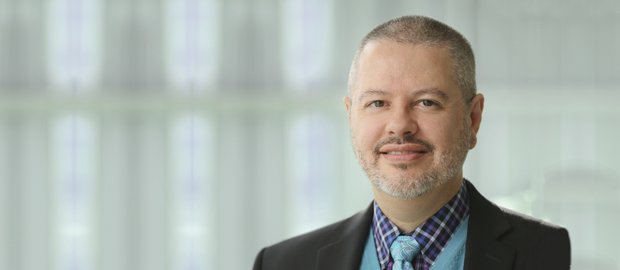A Q&A with Brandeis’ first Chief Diversity Officer Mark Brimhall-Vargas
Brandeis’ first chief diversity officer talks about diversity, equity and inclusion on campus
 PHOTO/Mike Lovett
PHOTO/Mike LovettBrandeis Chief Diversity Officer Mark Brimhall-Vargas
Mark Brimhall-Vargas became Brandeis’ first chief diversity officer (CDO) and vice president for diversity, equity and inclusion on Jan. 11. Appointed to the position last fall, Brimhall-Vargas has spent nearly two decades working to make universities more equitable places for their increasingly diverse faculty, staff and students. Most recently, he was CDO and associate provost at Tufts University, where he had primary responsibility for the implementation of that university’s 2013 President’s Diversity Report. Previously, he served for 17 years in various diversity management positions at the University of Maryland, College Park, including deputy CDO.
Brimhall-Vargas sat down for a conversation with BrandeisNOW shortly after his arrival.
BrandeisNOW: What are your first impressions of Brandeis?
Brimhall-Vargas: One thing that immediately strikes me about the community is the willingness of faculty and staff to engage in events that are a part of the culture of the institution, and the willingness of students to come out in large numbers and support each other. I attended Mela 2016 [an annual charity show that promotes understanding and awareness of South Asian culture] in November and the annual Dr. Martin Luther King Jr. Memorial event [this year titled “Black Girl Magic”]. They were literally packed, standing room only, and I thought, that says something about this institution, and the desire of people who are here to participate, to engage, to support one another, to create the community we hope for.
You’ve been engaged with diversity in university life for a long time. Have the issues changed?
When I started my career, the vast majority of the emphasis on diversity was about race, and, over time, diversity work has expanded. People live their identities in a holistic way — they don’t live them in a siloed way. So, fortunately, the robustness of the scholarship, the research, the practice and the programing around diversity, equity and inclusion has all become more sophisticated. The difficulty today, however, is that we need to address diversity broadly, and race continues to have a central place that needs to be explored, developed and, frankly, solved. We need to make progress on race because if we don’t, we can’t make progress on these other facets of identity.
I believe the reason race continues to be a central concern is the extreme lack of skill that we generally have in addressing it and engaging with it, and even in accepting the reality of its impact. No one seriously says that gender or socioeconomic status has no impact in our society, but there are people saying race is not a factor in our society anymore. That is simply not true.
There’s significant energy and commitment on the part of both faculty and students around making Brandeis more diverse. How do you plan to harness that?
The first thing I have to do is listen. I must listen to what people’s actual experiences are. When I was younger, a colleague told me, “When we have no complaints, that’s when we really have a problem. People who complain still want something better for the institution. Essentially, complaint reveals commitment.” I want to make sure if people have something to say — whether it’s a complaint or a positive comment — I’m here to listen.
There is discussion around the country about whether there is tension between increasing diversity and free expression. How do you view that dynamic?
I’m glad to be a member of the task force set up to discuss free expression on campus, because it’s an important issue. The task force has met twice so far, and I have seen that it is very invested in getting this right for the campus across perspectives and identities.
Some people have indicated that increasing diversity has forced them to “think twice before they say something” because of how a comment might be perceived or the response it might get, that this moment of self-reflection is evidence of a broader “chilling effect.” I think that is far too simplistic an analysis. My response would be “I hope we would all think before we speak anyway!” Imagine what our campus would look like if everyone said whatever came to mind with no consideration for the impact those words would have on others — we would invariably do harm to our own community.
That said, we have to be able to explore difficult topics, especially at a university, and even difficult topics related to identity. Let’s imagine someone says, “I don’t believe that affirmative action is something we should have anymore, because we have made adequate progress.” We should be able to explore the legitimate, fact-based policy pros and cons of employment- or admissions-based affirmative action and not have someone be pilloried and shunned.
I think that the right and the left in higher education and across our nation are not skilled enough yet at engaging in dialogue. We need to get better at it, or our students won’t be as prepared as they should be, and deserve to be, when engaging others in a world that desperately needs this kind of leadership.
Categories: General, Student Life





